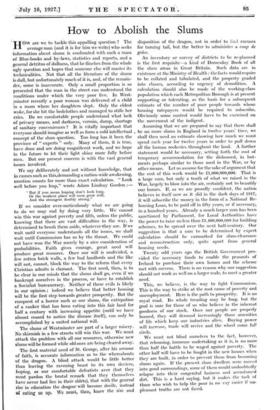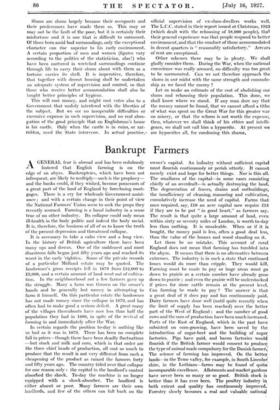How to Abolish the Slums
HO W are we to tackle this appalling question ? The average man (and it is for him we write) who seeks Information about slums is confronted with such a mass of Blue-books and by-laws, statistics and reports, and a general detritus of dullness, that he flinches from the whole -ugly question and hopes that someone else will master its technicalities. Not that all the literature of the slums is dull, but unfortunately much of it is, and, of the remain- der, some is inaccurate. Only a small proportion is so presented that the man in the street can understand the conditions under which the very poor live. In West- fninster recently a poor woman was delivered of a child in a room where her daughters slept. Only the eldest woke, for she bit the bedclothes and managed to stifle her cries. Do we comfortable people understand what lack of privacy means, and darkness, vermin, damp, shortage of sanitary conveniences ? It is vitally important that everyone should imagine as well as form a cold intellectual concept of the slum question. Too long has it been the province of " experts " only. Many of them, it is true, have done and are doing magnificent work, and we hope in the future to let their light shine more fully before men. But our present concern is with the vast general issues involved.
We say deliberately and not without knowledge, that in causes such as this,demanding a nation-wide awakening, emotion counts for more than exact calculation. " Look well before you leap," wrote Adam Lindsay Gordon :—
But if you mean leaping don't look long, Or the weakest place will soon grow stiff, And the strongest doubly strong."
If we consider over-meticulously what we are going to do we may end by doing very little. We cannot win this war against poverty and filth, unless the public, knowing that there are vast difficulties in the way, is determined to brush them aside, whatever they are. If we wait until everyone understands all the issues, we shall wait until Communism has us by the throat. We could not have won the War merely by a nice consideration of probabilities. Faith gives courage, great need will produce great resource. Once our will is undivided, a few rotten brick walls, a few bad landlords and the like will not, cannot, block the way to the reform that every Christian admits is clamant. The first need, then, is to be clear in our minds that the slums shall go, even if we bankrupt ourselves in the process, or have to establish a Socialist bureaucracy. Neither of these evils is likely in our opinion ; indeed we believe that better housing will be the first step towards greater prosperity. But the conquest of a horror such as our slums, the extirpation of a canker that has been eating into this fair land for half a century with increasing appetite (until we have almost ceased to notice the disease itself), can only be accomplished by a united national will.
The slums of Westminster are part of a larger misery. No skirmish in a few streets will win this war. We must attack the problem with all our resources, otherwise new slums will be formed while old ones are being cleared away.
The first material need of St. George, after his armour of faith, is accurate information as to the whereabouts nf the dragon. A blind attack would be little better than leaving the ravening beast to its own devices, hoping, as our comfortable defeatists aver (but they must pardon the brutal remark that they themselves have never had lice in their shirts), that with the general rise in education the dragon' will become docile, instead of eating us up. We must, then, know the size and disposition of the dragon, not in order to find excuses for turning tail, but the better to administer a coup de grace.
An inventory or survey of districts to be re-planned is the first requisite—a kind of Domesday Book of all the slum areas in Great Britain. Such data are in existence at the Ministry of Health : the facts would require to be collated and tabulated, and the property graded into classes, according to urgency of demolition. A calculation should also be made of the working-class population which each Metropolitan Borough is at present supporting or tolerating, as the basis for a subsequent estimate of the number of poor people towards whose housing ratepayers would be required to subscribe. Obviously some control would have to be exercised on the movement of the indigent. • Assuming that we are prepared to say that there shall be no more slums in England in twelve years' time, we shall then need an estimate showing how much we must spend each year for twelve years in order to pull down all the human rookeries throughout the land. A further statement would be necessary, setting forth the cost of temporary accommodation for the dishoused, in hut- ments perhaps similar to those used in the War, or by other means. Let us assume for the sake of argument that the cost of this work would be £1,000,000,000. That is a large sum, but only a tenth of what we raised in the War, largely to blow into the air, certainly not to beautify our homes. If, as we are proudly confident, the nation believes in itself now as it did in the dark days of 1917, it will subscribe the money in the form of a National Re- housing Loan, to be paid off in fifty years, or if necessary, in a hundred years. Already a much larger sum has been sanctioned by Parliament, for Local Authorities have the power to raise no less than £1,400,000,000 for building schemes, to be spread over the next half-century. Our suggestion is that a sum to be determined by expert calculation should be earmarked for slum-clearance and reconstruction only, quite apart from general housing needs.
Twenty odd years ago the British Government pro- vided the necessary funds to enable the peasants of Ireland to purchase their own homes and the scheme met with success. There is no reason why our suggestion should not work as well on a larger scale, to meet a greater need.
This, we believe, is the way to fight Communism. This is the way to strike at the root cause of poverty and unemployment. Here is the path to prosperity. It is no royal road. Its whole treading may be long, but the goal is sure for those of us who believe in the inherent goodness of our stock. Once our people are properly housed, they will demand increasingly those amenities of life which keep our industries alive. Buying power will increase, trade will revive and the wheel come full circle.
We must not blind ourselves to the fact, however, that rehousing, immense undertaking as it is, is no more than half the battle to be waged against poverty. The other half will have to be fought in the new houses when they are built; in order to prevent them from becoming slums again. If the present slum dwellers were moved into good surroundings, some of them would undoubtedly relapse into their congenital laziness and accustomed dirt. This is a hard saying, but it makes the task of those who wish to help the poor in no way easier if pleasant truths are not faced: Slums are slums largely because their occupants and their predecessors have made them so. This may or may not be the fault of the poor, but it is certainly their misfortune and it is one that is difficult to surmount. Of those born amid bad surroundings, only the exceptional character can rise superior to his early environment. A certain proportion of men and women (figures vary according to the politics of the statistician, alas !) who have been nurtured in wretched surroundings continue through life to carry their slums about with them as a tortoise carries its shell. It is imperative, therefore, that together with decent housing shall be undertaken an adequate system of supervision and control, so that those who receive better accommodation shall also be taught better principles of hygiene.
This will cost money, and might cost votes also to a Government that unduly interfered with the liberties of the subject. But we see no insuperable difficulties or excessive expense in such supervision, and no real abro- gation of the good principle that an Englishman's house is his castle. Only when the castle is in ruins, or rat- ridden, need the State intervene. In actual practice,• official supervision of ex-slum-dwellers works well. The L.C.C. stated in their report issued at Christmas, 1925 (which dealt with the rehousing of 18,000 people), that their general experience was that people respond to better environment, and that the conduct of those accommodated in decent quarters is " reasonably satisfactory." Arrears of rent are exceptional.
Other schemes there may be in plenty. We shall gladly consider them. During the War, when the national conscience was really aroused, no difficulty was too great to be surmounted. Can we not therefore approach the slums in our midst with the same strength and comrade- ship as we faced the enemy ?
Let us make an estimate of the cost of abolishing our slums and rehousing their population. This done, we shall know where we stand. If any man dare say that the money cannot be found, that we cannot afford a tithe of what was spent on the Great War for this greater war on misery, or that the reform is not worth the expense, then, whatever we shall think of his ethics and intelli- gence, we shall not call him a hypocrite. At present we are hypocrites all, for condoning this shame,











































 Previous page
Previous page